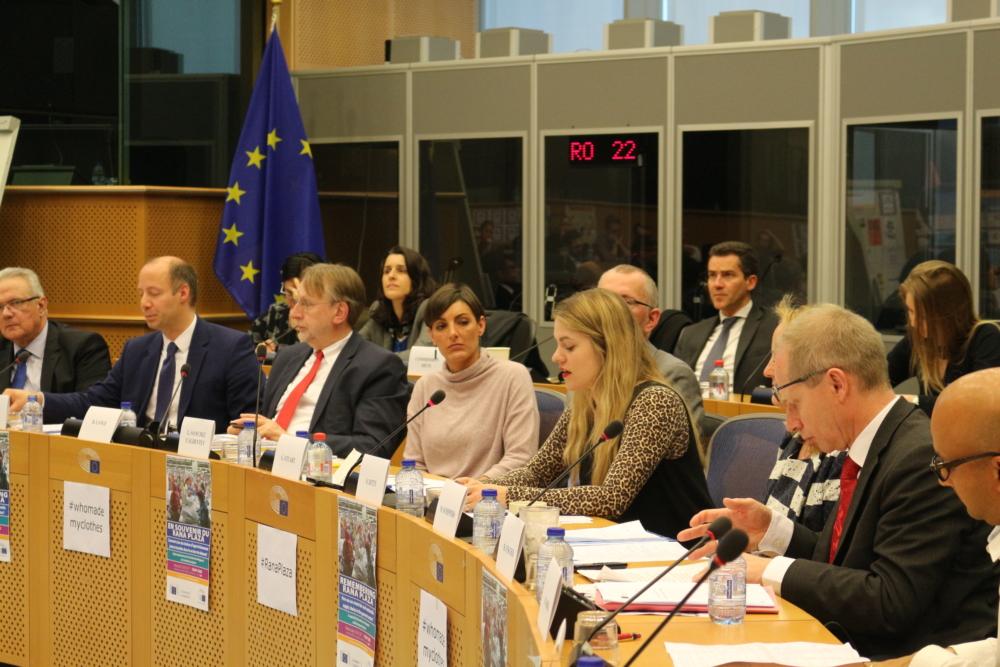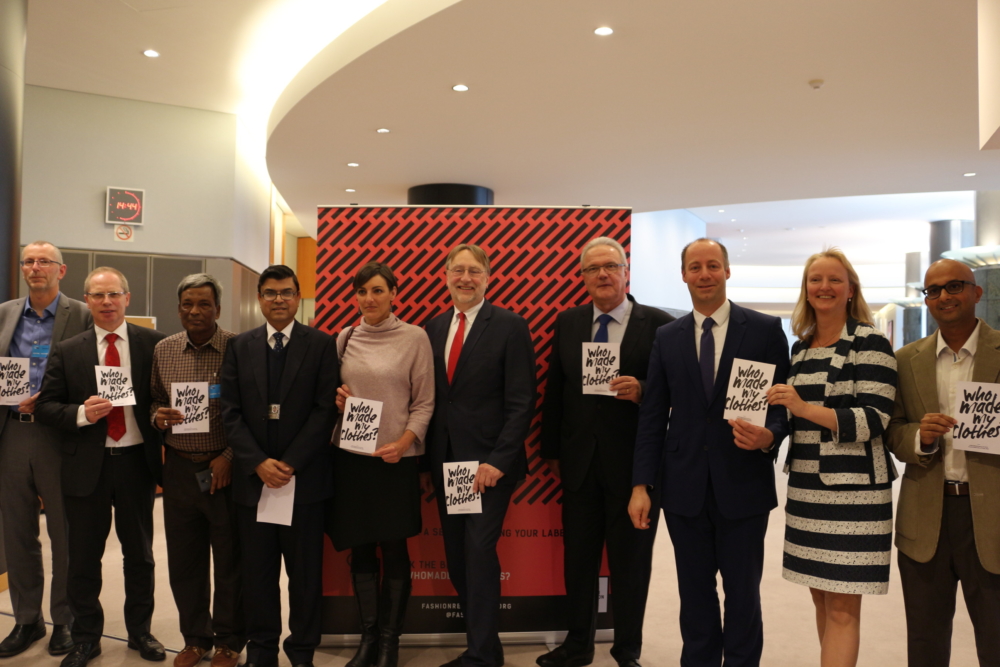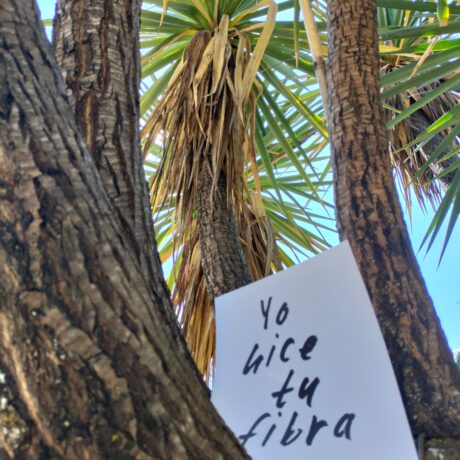Fashion Revolution spoke to the European Parliament. And they listened.
On 26th April 2017, Fashion Revolution’s Head of Policy, Sarah Ditty, spoke at a high-level meeting in the European Parliament “Remembering Rana Plaza – how can we create fair and sustainable supply chains in the garment sector?”
This event came the day before an important plenary vote by Members of the European Parliament (MEPs) on a report pushing rules to curb worker exploitation throughout fashion’s global supply chains.
Good news! The European Parliament passed the resolution 505 votes against 49 with 57 abstentions. The hope is that this will lead to laws, which will ensure better working conditions for the people who make our clothes. Read the speech that Sarah gave yesterday to the European policymakers in support of the report and #whomademyclothes

“Fashion Revolution was born out of the Rana Plaza factory collapse. It started with a group of a dozen designers, academics, writers, fashion professionals and concerned citizens who felt enough is enough. A big push for system-wide change was needed more than ever.
We have since grown to become the largest fashion activism movement in the world with teams in 100 countries, including most European countries. Fashion Revolution Week is a time when hundreds of thousands of people all around the world take to social media and the streets to ask one simple question: who made my clothes? We believe this simple question gets people thinking differently about what they wear. We believe this simple question has the power to push the industry to be more transparent. If brands and retailers are encouraged to answer this question, they must take a closer look at their supply chains.
Last April our campaign reached 159 million people globally through social media and our online media reach alone in April was over 22 billion across more than a thousand articles in the press and blogs.
During this week, we also encourage producers and workers to respond with the hashtag #imadeyourclothes allowing them to stand up, be seen and celebrated, and we ask brands and retailers to respond to #whomademyclothes in order to demonstrate transparency in their supply chain. We are seeing brands increasingly getting involved.
I am here today representing the hundreds of thousands of people who participate in Fashion Revolution’s call for a safer, cleaner, fairer and more transparent apparel industry — particularly young people — of which tens of thousands of us are residents and citizens of European countries, your constituents, to tell you how much we love fashion but that we don’t want our clothes to be made off the back of exploitation, poor working conditions, unjust trade and environmental destruction. That’s a price we truly do not want to pay or worse, to inflict on others. And we believe that the government’s role — at the European level — is crucial to ensure our clothes are never made in this way.

Through our movement we celebrate fashion as a positive influence while also questioning, at times scrutinising, the industry’s practices and raising awareness of its most pressing issues.
We aim to show that change is possible and encourage those who are on a journey to create a more ethical and sustainable future for fashion. But responsible purchasing decisions are not easy to make. As consumers, we just don’t know enough about the impacts of our clothing. This needs to change.
On Monday we launched the second edition of the Fashion Transparency Index. We have reviewed and ranked 100 of the biggest global fashion brands and retailers across a variety of market segments including high street to sportswear to luxury. Brands have been ranked according to how much information they disclose about their suppliers, supply chain policies and practices, and social and environmental impact.
Brands achieved on average 49 out of 250, which is less than 20% of the total possible points. And none of the brands on the list scored above 50% — proving that there is still a long way to go towards transparency.
Overall brands are publishing the most about their policies and commitments — with 98% of the brands publishing at least some relevant social and environmental policies. However, far more space is given to brands’ values and beliefs than to their actual actions and outcomes. Brands score far fewer points when you drive further into detail about the impact of their practices on the lives of workers in their supply chains and on the environment.
The good news is that 32 of the brands are publishing supplier lists, at least at the first tier — where they have direct sourcing relationships and where garments are typically cut, sewn and trimmed. This is an increase from last year when we surveyed 40 big fashion companies and only 5 were publishing supplier lists.
In the past year we have seen brands such as ASOS, Gap, Marks & Spencer, and several others publish factory lists. This is a welcome and necessary step forward. 14 out of the 100 brands are also publishing their processing facilities where clothes are dyed, printed, laundered and otherwise finished at an earlier stage of production.
However, no brand publishes its raw material suppliers so there is no way of knowing where our cotton, wool or other fibres come from, who produces them and under what conditions. Meanwhile only 34 of the 100 brands we reviewed have made public commitments to paying living wages to workers in their supply chains, and only four brands are reporting progress against this goal — progress that has been very slow.
Finally, I would like to stress just how difficult it is to find information about brands’ supply chain and sustainability efforts. Information is often found many clicks away from the homepage of brands’ websites; or you might have to trawl through a 300+ page annual report; or you might find information using all sorts of different industry jargon and presented with an array of different visuals. No wonder consumers find it all so confusing! How are we supposed to make informed decisions about what we buy when the information is either entirely absent or presented in such varied and complicated ways?
We hope the findings of the Fashion Transparency Index encourages more consumers to ask brands #whomademyclothes pushing for more disclosure about the products we buy and wear. We hope the Index influences brands and retailers to start disclosing more information about their suppliers, practices and impacts too. We believe it will.
We hope our research facilitates the good work already being done by NGOs and unions on the ground in producing countries, equipping them with clearer data. And finally and most importantly for today’s vote, we hope that our work demonstrates to you policymakers the pressing need not only for greater transparency from the industry but that this must be underpinned by mandatory due diligence and regulations that have real teeth so that there will be a “race to the top”— and so that the brands who are trying to do the right thing no longer face a market where brands are competing on the basis of the cheapest labour costs or the cheapest materials and processes but rather on the basis of quality, design and creativity.
We, Fashion Revolution, as a voice of thousands and thousands of everyday concerned European citizens and consumers, ask you to vote in favour of the report tomorrow. We hope this is the first step towards a fashion industry in Europe that values people, planet and profit equally.”








